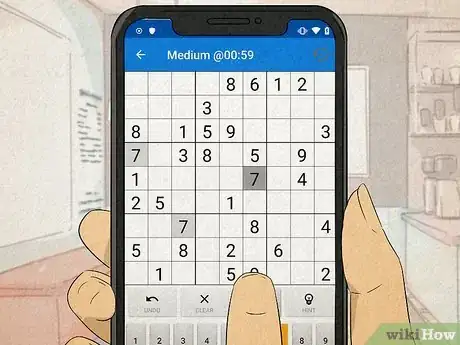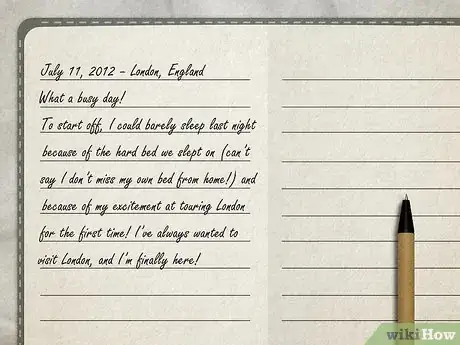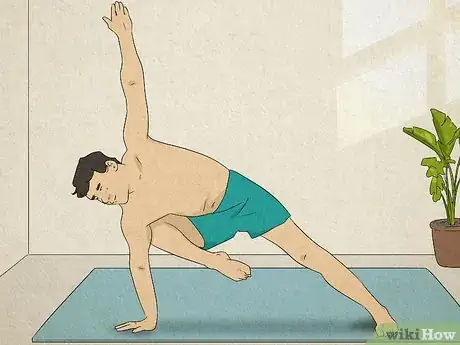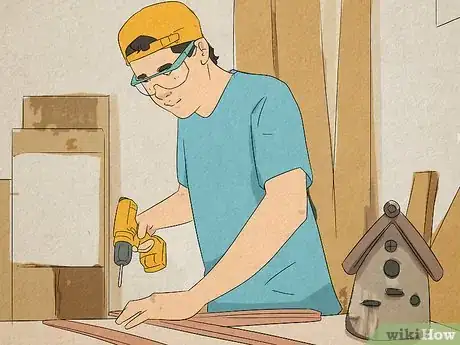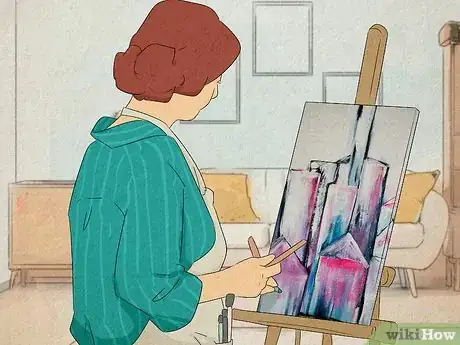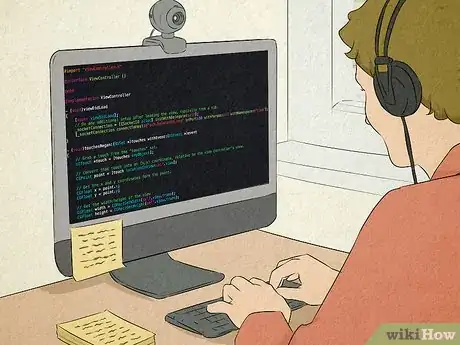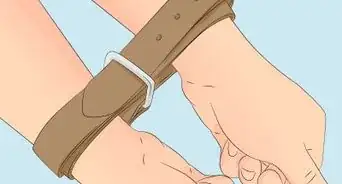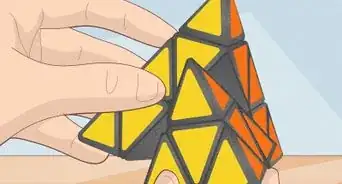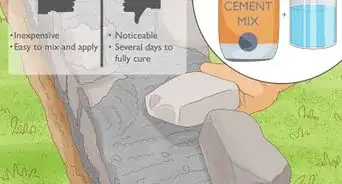This article was co-authored by Adrian Klaphaak, CPCC and by wikiHow staff writer, Christopher M. Osborne, PhD. Adrian Klaphaak is a career coach and founder of A Path That Fits, a mindfulness-based boutique career and life coaching company in the San Francisco Bay Area. He is also is an accredited Co-Active Professional Coach (CPCC). Klaphaak has used his training with the Coaches Training Institute, Hakomi Somatic Psychology and Internal Family Systems Therapy (IFS) to help thousands of people build successful careers and live more purposeful lives.
There are 10 references cited in this article, which can be found at the bottom of the page.
wikiHow marks an article as reader-approved once it receives enough positive feedback. This article has 18 testimonials from our readers, earning it our reader-approved status.
This article has been viewed 1,370,606 times.
Having a hobby you enjoy makes life more fulfilling, but first, you have to find one that's right for you. If you're not sure where to start, don't worry—we've compiled some popular hobbies (and some more niche ones that are just as fun) to help you out. Read on to see if any of the options listed here spark your curiosity.
Steps
Expert Q&A
Did you know you can get premium answers for this article?
Unlock premium answers by supporting wikiHow
-
QuestionShould I turn my hobby into a career?
 Adrian Klaphaak, CPCCAdrian Klaphaak is a career coach and founder of A Path That Fits, a mindfulness-based boutique career and life coaching company in the San Francisco Bay Area. He is also is an accredited Co-Active Professional Coach (CPCC). Klaphaak has used his training with the Coaches Training Institute, Hakomi Somatic Psychology and Internal Family Systems Therapy (IFS) to help thousands of people build successful careers and live more purposeful lives.
Adrian Klaphaak, CPCCAdrian Klaphaak is a career coach and founder of A Path That Fits, a mindfulness-based boutique career and life coaching company in the San Francisco Bay Area. He is also is an accredited Co-Active Professional Coach (CPCC). Klaphaak has used his training with the Coaches Training Institute, Hakomi Somatic Psychology and Internal Family Systems Therapy (IFS) to help thousands of people build successful careers and live more purposeful lives.
Career Coach I think we're living in a really unique time when almost any hobby can be turned into a job. I had a client who loved belly dancing, and now she travels around the world teaching belly dancing lessons and performing. It can take some time to get to the point where you're making meaningful money doing what you love, but you can always work towards this goal on the side while you're still at your normal job.
I think we're living in a really unique time when almost any hobby can be turned into a job. I had a client who loved belly dancing, and now she travels around the world teaching belly dancing lessons and performing. It can take some time to get to the point where you're making meaningful money doing what you love, but you can always work towards this goal on the side while you're still at your normal job. -
QuestionHow can I figure out if I enjoy a hobby?
 Adrian Klaphaak, CPCCAdrian Klaphaak is a career coach and founder of A Path That Fits, a mindfulness-based boutique career and life coaching company in the San Francisco Bay Area. He is also is an accredited Co-Active Professional Coach (CPCC). Klaphaak has used his training with the Coaches Training Institute, Hakomi Somatic Psychology and Internal Family Systems Therapy (IFS) to help thousands of people build successful careers and live more purposeful lives.
Adrian Klaphaak, CPCCAdrian Klaphaak is a career coach and founder of A Path That Fits, a mindfulness-based boutique career and life coaching company in the San Francisco Bay Area. He is also is an accredited Co-Active Professional Coach (CPCC). Klaphaak has used his training with the Coaches Training Institute, Hakomi Somatic Psychology and Internal Family Systems Therapy (IFS) to help thousands of people build successful careers and live more purposeful lives.
Career Coach
-
QuestionWhat should I do if I start getting bored with my hobby?
 Adrian Klaphaak, CPCCAdrian Klaphaak is a career coach and founder of A Path That Fits, a mindfulness-based boutique career and life coaching company in the San Francisco Bay Area. He is also is an accredited Co-Active Professional Coach (CPCC). Klaphaak has used his training with the Coaches Training Institute, Hakomi Somatic Psychology and Internal Family Systems Therapy (IFS) to help thousands of people build successful careers and live more purposeful lives.
Adrian Klaphaak, CPCCAdrian Klaphaak is a career coach and founder of A Path That Fits, a mindfulness-based boutique career and life coaching company in the San Francisco Bay Area. He is also is an accredited Co-Active Professional Coach (CPCC). Klaphaak has used his training with the Coaches Training Institute, Hakomi Somatic Psychology and Internal Family Systems Therapy (IFS) to help thousands of people build successful careers and live more purposeful lives.
Career Coach I think it helps to connect with other people who enjoy the same thing you do. If you used to love collecting stamps and you're kind of getting bored with it, try reaching out to an online stamp-collecting community. Talk to them. Trade stamps, or talk about your collection. That's a great way to reignite your love for a hobby.
I think it helps to connect with other people who enjoy the same thing you do. If you used to love collecting stamps and you're kind of getting bored with it, try reaching out to an online stamp-collecting community. Talk to them. Trade stamps, or talk about your collection. That's a great way to reignite your love for a hobby.
References
- ↑ https://www.psychologytoday.com/us/blog/the-healthy-engaged-brain/202004/the-benefits-brain-boosting-hobbies
- ↑ https://www.thesuburban.com/arts_and_entertainment/entertainment/study-reveals-most-popular-hobbies-during-the-coronavirus-outbreak/article_882ebf2a-87e1-11ea-9c54-1fce0a4b2159.html
- ↑ https://www.nytimes.com/guides/smarterliving/how-to-find-a-hobby
- ↑ https://www.parentsandkids.com/38551/study-ranks-most-popular-hobbies-during-coronavirus-stay-at-home/
- ↑ https://medium.com/photo-dojo/beginning-photography-as-a-hobby-55b3652bad77
- ↑ https://www.nytimes.com/guides/smarterliving/how-to-find-a-hobby
- ↑ https://www.nytimes.com/guides/smarterliving/how-to-find-a-hobby
- ↑ https://www.thesuburban.com/arts_and_entertainment/entertainment/study-reveals-most-popular-hobbies-during-the-coronavirus-outbreak/article_882ebf2a-87e1-11ea-9c54-1fce0a4b2159.html
- ↑ http://udreview.com/opinion-bring-back-reading-as-a-hobby/
- ↑ https://www.nytimes.com/guides/smarterliving/how-to-find-a-hobby
- ↑ https://www.nytimes.com/guides/smarterliving/how-to-find-a-hobby
- ↑ https://www.thesuburban.com/arts_and_entertainment/entertainment/study-reveals-most-popular-hobbies-during-the-coronavirus-outbreak/article_882ebf2a-87e1-11ea-9c54-1fce0a4b2159.html
- ↑ https://www.nytimes.com/guides/smarterliving/how-to-find-a-hobby
- ↑ https://www.thesuburban.com/arts_and_entertainment/entertainment/study-reveals-most-popular-hobbies-during-the-coronavirus-outbreak/article_882ebf2a-87e1-11ea-9c54-1fce0a4b2159.html
- ↑ https://www.parentsandkids.com/38551/study-ranks-most-popular-hobbies-during-coronavirus-stay-at-home/
- ↑ https://www.hobsess.com/5-reasons-to-make-travel-your-hobby/
- ↑ https://www.army.mil/article/242786/depot_shines_spotlight_on_unique_employee_hobbies
- ↑ https://news.ua.edu/2021/04/explore-unique-hobbies-find-community-in-uas-outside-the-box-clubs/
- ↑ https://northiowatoday.com/2021/04/21/the-best-hobbies-for-nature-lovers/
- ↑ https://www.nytimes.com/guides/smarterliving/how-to-find-a-hobby
- ↑ https://www.nytimes.com/guides/smarterliving/how-to-find-a-hobby
- ↑ https://www.nytimes.com/guides/smarterliving/how-to-find-a-hobby
About This Article
To find a hobby, try walking around a craft store or hardware store and seeing if anything inspires you, like model airplane kits or woodworking supplies. You can also think back to what you liked to do as a kid, whether it was drawing, painting, collecting comic books, or some other hobby, and then pick up where you left off. If you're looking for a cheap hobby, consider taking up writing, gardening, running, or camping. To learn how to find a hobby based on your current interests and passions, keep reading!
